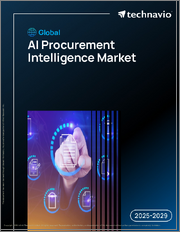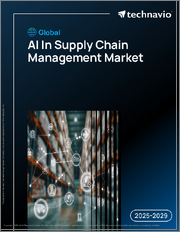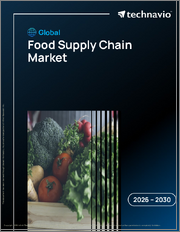
|
시장보고서
상품코드
1493405
SCaaS(Supply Chain As A Service) 시장 규모, 점유율, 동향 분석 리포트 : 제품별, 용도별, 최종 용도별, 지역별, 부문별 예측(2024-2030년)Supply Chain As A Service Market Size, Share & Trends Analysis Report By Product (Solutions, Service), By Application, By End-use, By Region, And Segment Forecasts, 2024 - 2030 |
||||||
SCaaS(Supply Chain As A Service) 시장 성장과 동향 :
Grand View Research, Inc.의 최신 리포트에 따르면 세계의 SCaaS(Supply Chain As A Service) 시장 규모는 2030년까지 264억 4,010만 달러에 달할 것으로 예측되며, 2024-2030년의 CAGR은 17.4%로 성장할 것으로 예측되고 있습니다.
SCaaS(Supply Chain As A Service)는 공급망의 다양한 요소와 프로세스를 제3의 서비스 프로바이더에 아웃소싱하는 것을 의미하며, 대부분 클라우드 기반 플랫폼과 기술을 활용합니다. 이 모델을 통해 기업은 전문 지식과 인프라를 활용하여 공급망 운영을 간소화하고 비용을 절감하며 효율성을 향상시킬 수 있으며, 앞서 언급한 SCaaS(Supply Chain As A Service)가 제공하는 이점은 시장 수요를 촉진할 것으로 예상됩니다. 촉진할 것으로 예상됩니다.
동적인 시장 환경과 변화하는 고객 기대에 적응하기 위해 민첩하고 유연한 공급망 솔루션에 대한 수요가 증가하고 있으며, SCaaS(Supply Chain As A Service)는 조직의 운영 효율성 향상, 재고 관리 최적화, 공급망 네트워크의 전반적인 가시성 향상, 혼란에 대한 위험 감소를 지원합니다. 공급망 네트워크 전반에 대한 가시성 향상, 혼란에 따른 위험 감소를 돕습니다. 또한 공급망 프로세스의 급속한 디지털화와 인공지능, 머신러닝, 블록체인과 같은 기술의 발전은 SCaaS 솔루션의 채택을 더욱 촉진하고 있으며, 기업은 혁신을 촉진하고 비용을 절감하며 오늘날의 빠르게 변화하는 상호 연결된 세계 경제에서 경쟁 우위를 확보할 수 있습니다. 경쟁 우위를 확보할 수 있도록 돕습니다.
기업은 다양한 산업, 비즈니스 및 공급망 모델의 특정 요구사항에 맞게 맞춤화할 수 있는 SCaaS 솔루션을 제공합니다. 이러한 유연성을 통해 고객은 고유한 요구와 과제에 맞게 서비스를 조정할 수 있습니다. 또한 서비스 프로바이더로서 공급망은 고객 지원 서비스에 투자하여 고객에 대한 원활한 도입, 교육 및 지속적인 지원을 보장하기 위해 노력하고 있습니다. 여기에는 전담 고객 성공 팀, 교육 프로그램, 연중무휴 기술 지원 등 모든 문제나 우려 사항에 대응할 수 있는 연중무휴 기술 지원 등이 포함됩니다.
SCaaS(Supply Chain As A Service) 시장 보고서 하이라이트
- 용도별로는 자동 배송 분야가 2023년 25.14%의 최대 매출 점유율로 시장을 주도할 것으로 예상됩니다. 화물 크기, 무게, 배송지, 배송 일정 등 배송 요구 사항을 분석하여 각 주문에 가장 적합한 운송업체와 배송 방법을 선택할 수 있습니다.
- 최종 용도에 따라 의료 및 생명과학 분야는 엄격한 규제를 받고 있으며, GMP(Good Manufacturing Practices), GDP(Good Distribution Practices), HIPAA(Health Insurance Interoperability and Accountability Act)와 같은 표준을 준수하기 위해 공급망을 정확하게 관리해야 합니다. SCaaS 솔루션은 컴플라이언스 노력을 간소화하고, 추적성을 유지하며, 공급망 전반의 문서를 관리할 수 있는 툴을 제공합니다.
- 서비스 부문은 기업이 공급업체로부터 원자재, 부품 및 제품을 조달할 수 있도록 지원합니다. 여기에는 공급업체 식별, 자격 인증, 협상 및 계약 관리가 포함되며, 비용 효율적이고 효율적인 조달 프로세스를 달성할 수 있습니다.
- 2023년 3월, 인포시스는 SAP Integrated Business Planning과 Infosys Cobalt 솔루션의 결합을 통한 공급망 혁신을 위해 독일의 자동차 부품 제조업체인 ZF와 전략적 협업을 발표했습니다. 밝혔습니다. 이번 제휴를 통해 ZF 애프터마켓 부문공급망 운영 전반에 걸쳐 최첨단 수요 예측, 협업 계획, 대응력 및 효율성 강화, 투명성 향상, 인터랙티브한 사용자 경험 도입이 촉진될 것으로 기대됩니다.
목차
제1장 조사 방법과 범위
제2장 주요 요약
제3장 SCaaS(Supply Chain As A Service) 변수, 동향, 범위
- 시장 계통 전망
- 집중과 성장 전망 매핑
- 업계 밸류체인 분석
- 유통 채널 분석
- 원재료의 동향
- 기술 개요
- 규제 프레임워크
- 테크놀러지의 개요
- 시장 역학
- 시장 촉진요인 분석
- 시장 억제요인 분석
- 업계의 과제
- 업계의 기회
- 벤더 구도
- 경제 메가트렌드 분석
- 업계 분석 툴
- Porter's Five Forces 분석
- 거시환경 분석
제4장 SCaaS(Supply Chain As A Service) : 제품 추정·동향 분석
- 제품 변동 분석과 시장 점유율, 2023년과 2030년
- 제품별, 2018-2030년
- 솔루션
- 서비스
제5장 SCaaS(Supply Chain As A Service) : 용도 추정·동향 분석
- 용도 변동 분석과 시장 점유율, 2023년과 2030년
- 용도별, 2018-2030년
- 주문 관리
- 계약 제조
- 창고 관리
- 자동 배송
- 반품 관리
제6장 SCaaS(Supply Chain As A Service) : 최종 용도 추정·동향 분석
- 최종 용도 변동 분석과 시장 점유율, 2023년과 2030년
- 최종 용도별, 2018-2030년
- 소매·E-Commerce
- 제조업
- 헬스케어와 생명과학
- 식품 및 음료
- 기타
제7장 SCaaS(Supply Chain As A Service) : 지역 추정·동향 분석
- 지역 변동 분석과 시장 점유율, 2023년과 2030년
- 북미
- 시장 추정·예측, 2018-2030년
- 제품별2018-2030
- 용도별2018-2030년
- 최종 용도별2018-2030
- 미국
- 캐나다
- 멕시코
- 유럽
- 시장 추정·예측, 2018-2030년
- 제품별2018-2030
- 용도별2018-2030
- 최종 용도별2018-2030
- 독일
- 프랑스
- 영국
- 이탈리아
- 스페인
- 아시아태평양
- 시장 추정·예측, 2018-2030년
- 제품별2018-2030
- 용도별2018-2030
- 최종 용도별2018-2030
- 중국
- 인도
- 일본
- 한국
- 중남미
- 시장 추정·예측, 2018-2030년
- 제품별2018-2030
- 용도별2018-2030
- 최종 용도별2018-2030
- 브라질
- 중동 및 아프리카
- 시장 추정·예측, 2018-2030년
- 제품별2018-2030
- 용도별2018-2030
- 최종 용도별2018-2030
- 사우디아라비아
- 아랍에미리트
제8장 SCaaS(Supply Chain As A Service)-경쟁 구도
- 주요 시장 참여 기업에 의한 최근 동향과 영향 분석
- 기업 분류
- 기업의 시장 점유율/포지션 분석, 2023년
- 기업 히트맵 분석
- 전략 매핑
- 확대
- 합병과 인수
- 파트너십과 협업
- 신제품의 발매
- 연구개발
- 기업 개요
- IBM Corporation
- Oracle Corporation
- SAP SE
- Accenture
- DHL International GmbH
- Blue Yonder(formerly JDA Software)
- Kinaxis Inc.
- Manhattan Associates, Inc.
- Infor Inc.
- BluJay Solutions
- Descartes Systems Group Inc.
- GT Nexus(Infor)
- Elemica
- American Software, Inc.
- Korber AG
Supply Chain As A Service Market Growth & Trends:
The global supply chain as a service market size is anticipated to reach USD 26,440.1 million by 2030 and is projected to grow at a CAGR of 17.4% from 2024 to 2030, according to a new report by Grand View Research, Inc. supply chain as a service (SCaaS) refers to outsourcing various elements or processes of the supply chain to third-party service providers, often utilizing cloud-based platforms and technologies. This model allows businesses to streamline their supply chain operations, reduce costs, and improve efficiency by leveraging specialized expertise and infrastructure. These aforementioned advantages offered by supply chain as a service are expected to propel the market demand.
Increasing demand for agile and flexible supply chain solutions to adapt to dynamic market conditions and evolving customer expectations. Supply chain as a service helps organizations enhance operational efficiency, optimize inventory management, improve visibility across the supply chain network, and mitigate risks associated with disruptions. Moreover, the rapid digitization of supply chain processes, coupled with advancements in technologies like artificial intelligence, machine learning, and blockchain, is further fueling the adoption of SCaaS solutions, enabling businesses to drive innovation, reduce costs, and gain a competitive edge in today's fast-paced and interconnected global economy.
Companies are offering customizable SCaaS solutions tailored to the specific requirements of different industries, businesses, and supply chain models. This flexibility allows clients to adapt the services to their unique needs and challenges. Further, supply chain as a service providers are investing in customer support services to ensure seamless implementation, training, and ongoing support for their clients. Which includes dedicated customer success teams, training programs, and 24/7 technical support to address any issues or concerns
Supply Chain As A Service Market Report Highlights:
- Based on application, the automated shipping segment led the market with the largest revenue share of 25.14% in 2023. It helps to analyze shipping requirements, including package size, weight, destination, and delivery timeline, to select the optimal carrier and shipping method for each order
- Based on end-use, the healthcare and life sciences segment are highly regulated, necessitating precise management of the supply chain to ensure compliance with standards like Good Manufacturing Practice (GMP), Good Distribution Practice (GDP), and the Health Insurance Portability and Accountability Act (HIPAA). SCaaS solutions offer tools to streamline compliance efforts, maintain traceability, and manage documentation throughout the supply chain
- The service segment helps businesses to source raw materials, components, and products from suppliers. This includes supplier identification, qualification, negotiation, and contract management to ensure cost-effective and efficient procurement processes
- In March 2023, Infosys revealed a strategic collaboration with ZF, a leading German car parts manufacturer, aimed at transforming its supply chain using a combination of SAP Integrated Business Planning and Infosys Cobalt solutions. This partnership has facilitated the implementation of cutting-edge demand forecasting, collaborative planning, enhanced responsiveness and efficiency, improved transparency, and an interactive user experience throughout ZF's aftermarket division's supply chain operations
Table of Contents
Chapter 1. Methodology and Scope
- 1.1. Market Segmentation & Scope
- 1.2. Market Definition
- 1.3. Information Procurement
- 1.3.1. Purchased Database
- 1.3.2. GVR's Internal Database
- 1.3.3. Secondary Sources & Third-Party Perspectives
- 1.3.4. Primary Research
- 1.4. Information Analysis
- 1.4.1. Data Analysis Models
- 1.5. Market Formulation & Data Visualization
- 1.6. Data Validation & Publishing
Chapter 2. Executive Summary
- 2.1. Market Snapshot
- 2.2. Segment Snapshot
- 2.3. Competitive Landscape Snapshot
Chapter 3. Supply Chain As A Service (SCaaS) Variables, Trends & Scope
- 3.1. Market Lineage Outlook
- 3.2. Concentration & Growth Prospect Mapping
- 3.3. Industry Value Chain Analysis
- 3.3.1. Distribution Channel Analysis
- 3.3.2. Raw Material Trends
- 3.3.3. Technological Overview
- 3.4. Regulatory Framework
- 3.5. Technology Overview
- 3.6. Market Dynamics
- 3.6.1. Market Driver Analysis
- 3.6.2. Market Restraint Analysis
- 3.6.3. Industry Challenges
- 3.6.4. Industry Opportunities
- 3.7. Vendor Landscape
- 3.8. Economic Mega-Trend Analysis
- 3.9. Industry Analysis Tools
- 3.9.1. Porter's Five Forces Analysis
- 3.9.2. Macro-environmental Analysis
Chapter 4. Supply Chain As A Service (SCaaS): Product Estimates & Trend Analysis
- 4.1. Product Movement Analysis & Market Share, 2023 & 2030
- 4.2. Supply Chain As A Service Estimates & Forecast, By Product, 2018 to 2030 (USD Million)
- 4.3. Solutions
- 4.3.1. Market Revenue Estimates and Forecasts, 2018 - 2030 (USD Million)
- 4.4. Service
- 4.4.1. Market Revenue Estimates and Forecasts, 2018 - 2030 (USD Million)
Chapter 5. Supply Chain As A Service (SCaaS): Application Estimates & Trend Analysis
- 5.1. Application Movement Analysis & Market Share, 2023 & 2030
- 5.2. Supply Chain As A Service Estimates & Forecast, By Application, 2018 to 2030 (USD Million)
- 5.3. Order Management
- 5.3.1. Market Revenue Estimates and Forecasts, 2018 - 2030 (USD Million)
- 5.4. Contract Manufacturing
- 5.4.1. Market Revenue Estimates and Forecasts, 2018 - 2030 (USD Million)
- 5.5. Warehouse Management
- 5.5.1. Market Revenue Estimates and Forecasts, 2018 - 2030 (USD Million)
- 5.6. Automated Shipping
- 5.6.1. Market Revenue Estimates and Forecasts, 2018 - 2030 (USD Million)
- 5.7. Returns Management
- 5.7.1. Market Revenue Estimates and Forecasts, 2018 - 2030 (USD Million)
Chapter 6. Supply Chain As A Service (SCaaS): End-use Estimates & Trend Analysis
- 6.1. End-use Movement Analysis & Market Share, 2023 & 2030
- 6.2. Supply Chain As A Service Estimates & Forecast, By End-use, 2018 to 2030 (USD Million)
- 6.3. Retail & E-commerce
- 6.3.1. Market Revenue Estimates and Forecasts, 2018 - 2030 (USD Million)
- 6.4. Manufacturing Industry
- 6.4.1. Market Revenue Estimates and Forecasts, 2018 - 2030 (USD Million)
- 6.5. Healthcare and life sciences
- 6.5.1. Market Revenue Estimates and Forecasts, 2018 - 2030 (USD Million)
- 6.6. Food & Beverages
- 6.6.1. Market Revenue Estimates and Forecasts, 2018 - 2030 (USD Million)
- 6.7. Others
- 6.7.1. Market Revenue Estimates and Forecasts, 2018 - 2030 (USD Million)
Chapter 7. Supply Chain As A Service (SCaaS): Regional Estimates & Trend Analysis
- 7.1. Regional Movement Analysis & Market Share, 2023 & 2030
- 7.2. North America
- 7.2.1. Market estimates & forecast, 2018 - 2030 (USD Million)
- 7.2.2. Market estimates & forecast, by product 2018 - 2030 (USD Million)
- 7.2.3. Market estimates & forecast, by application 2018 - 2030, (USD Million
- 7.2.4. Market estimates & forecast, by end-use 2018 - 2030 (USD Million)
- 7.2.5. U.S.
- 7.2.5.1. Key country dynamics
- 7.2.5.2. Market estimates & forecast, 2018 - 2030 (USD Million)
- 7.2.5.3. Market estimates & forecast, by product 2018 - 2030 (USD Million)
- 7.2.5.4. Market estimates & forecast, by application 2018 - 2030 (USD Million)
- 7.2.5.5. Market estimates & forecast, by end-use 2018 - 2030 (USD Million)
- 7.2.6. Canada
- 7.2.6.1. Key country dynamics
- 7.2.6.2. Market estimates & forecast, 2018 - 2030 (USD Million)
- 7.2.6.3. Market estimates & forecast, by product 2018 - 2030 (USD Million)
- 7.2.6.4. Market estimates & forecast, by application 2018 - 2030 (USD Million)
- 7.2.6.5. Market estimates & forecast, by end-use 2018 - 2030 (USD Million)
- 7.2.7. Mexico
- 7.2.7.1. Key country dynamics
- 7.2.7.2. Market estimates & forecast, by product 2018 - 2030 (USD Million)
- 7.2.7.3. Market estimates & forecast, by application 2018 - 2030 (USD Million)
- 7.2.7.4. Market estimates & forecast, by end-use 2018 - 2030 (USD Million)
- 7.3. Europe
- 7.3.1. Market estimates & forecast, 2018 - 2030 (USD Million)
- 7.3.2. Market estimates & forecast, by product 2018 - 2030 (USD Million)
- 7.3.3. Market estimates & forecast, by application 2018 - 2030 (USD Million)
- 7.3.4. Market estimates & forecast, by end-use 2018 - 2030 (USD Million)
- 7.3.5. Germany
- 7.3.5.1. Key country dynamics
- 7.3.5.2. Market estimates & forecast, 2018 - 2030 (USD Million)
- 7.3.5.3. Market estimates & forecast, by product 2018 - 2030 (USD Million)
- 7.3.5.4. Market estimates & forecast, by application 2018 - 2030 (USD Million)
- 7.3.5.5. Market estimates & forecast, by end-use 2018 - 2030 (USD Million)
- 7.3.6. France
- 7.3.6.1. Key country dynamics
- 7.3.6.2. Market estimates & forecast, 2018 - 2030 (USD Million)
- 7.3.6.3. Market estimates & forecast, by product 2018 - 2030 (USD Million)
- 7.3.6.4. Market estimates & forecast, by application 2018 - 2030 (USD Million)
- 7.3.6.5. Market estimates & forecast, by end-use 2018 - 2030 (USD Million)
- 7.3.7. UK
- 7.3.7.1. Key country dynamics
- 7.3.7.2. Market estimates & forecast, 2018 - 2030 (USD Million)
- 7.3.7.3. Market estimates & forecast, by product 2018 - 2030 (USD Million)
- 7.3.7.4. Market estimates & forecast, by application 2018 - 2030 (USD Million)
- 7.3.7.5. Market estimates & forecast, by end-use 2018 - 2030 (USD Million)
- 7.3.8. Italy
- 7.3.8.1. Key country dynamics
- 7.3.8.2. Market estimates & forecast, 2018 - 2030 (USD Million)
- 7.3.8.3. Market estimates & forecast, by product 2018 - 2030 (USD Million)
- 7.3.8.4. Market estimates & forecast, by application 2018 - 2030 (USD Million)
- 7.3.8.5. Market estimates & forecast, by end-use 2018 - 2030 (USD Million)
- 7.3.9. Spain
- 7.3.9.1. Key country dynamics
- 7.3.9.2. Market estimates & forecast, 2018 - 2030 (USD Million)
- 7.3.9.3. Market estimates & forecast, by product 2018 - 2030 (USD Million)
- 7.3.9.4. Market estimates & forecast, by application 2018 - 2030 (USD Million)
- 7.3.9.5. Market estimates & forecast, by end-use 2018 - 2030 (USD Million)
- 7.4. Asia Pacific
- 7.4.1. Market estimates & forecast, 2018 - 2030 (USD Million)
- 7.4.2. Market estimates & forecast, by product 2018 - 2030 (USD Million)
- 7.4.3. Market estimates & forecast, by application 2018 - 2030 (USD Million)
- 7.4.4. Market estimates & forecast, by end-use 2018 - 2030 (USD Million)
- 7.4.5. China
- 7.4.5.1. Key country dynamics
- 7.4.5.2. Market estimates & forecast, 2018 - 2030 (USD Million)
- 7.4.5.3. Market estimates & forecast, by product 2018 - 2030 (USD Million)
- 7.4.5.4. Market estimates & forecast, by application 2018 - 2030 (USD Million)
- 7.4.5.5. Market estimates & forecast, by end-use 2018 - 2030 (USD Million)
- 7.4.6. India
- 7.4.6.1. Key country dynamics
- 7.4.6.2. Market estimates & forecast, 2018 - 2030 (USD Million)
- 7.4.6.3. Market estimates & forecast, by product 2018 - 2030 (USD Million)
- 7.4.6.4. Market estimates & forecast, by application 2018 - 2030 (USD Million)
- 7.4.6.5. Market estimates & forecast, by end-use 2018 - 2030 (USD Million)
- 7.4.7. Japan
- 7.4.7.1. Key country dynamics
- 7.4.7.2. Market estimates & forecast, 2018 - 2030 (USD Million)
- 7.4.7.3. Market estimates & forecast, by product 2018 - 2030 (USD Million)
- 7.4.7.4. Market estimates & forecast, by application 2018 - 2030 (USD Million)
- 7.4.7.5. Market estimates & forecast, by end-use 2018 - 2030 (USD Million)
- 7.4.8. South Korea
- 7.4.8.1. Key country dynamics
- 7.4.8.2. Market estimates & forecast, 2018 - 2030 (USD Million)
- 7.4.8.3. Market estimates & forecast, by product 2018 - 2030 (USD Million)
- 7.4.8.4. Market estimates & forecast, by application 2018 - 2030 (USD Million)
- 7.4.8.5. Market estimates & forecast, by end-use 2018 - 2030 (USD Million)
- 7.5. Central & South America
- 7.5.1. Market estimates & forecast, 2018 - 2030 (USD Million)
- 7.5.2. Market estimates & forecast, by product 2018 - 2030 (USD Million)
- 7.5.3. Market estimates & forecast, by application 2018 - 2030 (USD Million)
- 7.5.4. Market estimates & forecast, by end-use 2018 - 2030 (USD Million)
- 7.5.5. Brazil
- 7.5.5.1. Key country dynamics
- 7.5.5.2. Market estimates & forecast, 2018 - 2030 (USD Million)
- 7.5.5.3. Market estimates & forecast, by product 2018 - 2030 (USD Million)
- 7.5.5.4. Market estimates & forecast, by application 2018 - 2030 (USD Million)
- 7.5.5.5. Market estimates & forecast, by end-use 2018 - 2030 (USD Million)
- 7.6. Middle East & Africa
- 7.6.1. Market Estimates & Forecast, 2018 - 2030 (USD Million)
- 7.6.2. Market estimates & forecast, by product 2018 - 2030 (USD Million)
- 7.6.3. Market estimates & forecast, by application 2018 - 2030 (USD Million)
- 7.6.4. Market estimates & forecast, by end-use 2018 - 2030 (USD Million)
- 7.6.5. Saudi Arabia
- 7.6.5.1. Key country dynamics
- 7.6.5.2. Market estimates & forecast, 2018 - 2030 (USD Million)
- 7.6.5.3. Market estimates & forecast, by product 2018 - 2030 (USD Million)
- 7.6.5.4. Market estimates & forecast, by application 2018 - 2030 (USD Million)
- 7.6.5.5. Market estimates & forecast, by end-use 2018 - 2030 (USD Million)
- 7.6.6. UAE
- 7.6.6.1. Key country dynamics
- 7.6.6.2. Market estimates & forecast, 2018 - 2030 (USD Million)
- 7.6.6.3. Market estimates & forecast, by product 2018 - 2030 (USD Million)
- 7.6.6.4. Market estimates & forecast, by application 2018 - 2030 (USD Million)
- 7.6.6.5. Market estimates & forecast, by end-use 2018 - 2030 (USD Million)
Chapter 8. Supply Chain As A Service (SCaaS) - Competitive Landscape
- 8.1. Recent Developments & Impact Analysis, By Key Market Participants
- 8.2. Company Categorization
- 8.3. Company Market Share/Position Analysis, 2023
- 8.4. Company Heat Map Analysis
- 8.5. Strategy Mapping
- 8.5.1. Expansion
- 8.5.2. Mergers & Acquisition
- 8.5.3. Partnerships & Collaborations
- 8.5.4. New Product Launches
- 8.5.5. Research And Development
- 8.6. Company Profiles
- 8.6.1. IBM Corporation
- 8.6.1.1. Participant's overview
- 8.6.1.2. Financial performance
- 8.6.1.3. Product benchmarking
- 8.6.1.4. Recent developments
- 8.6.2. Oracle Corporation
- 8.6.2.1. Participant's overview
- 8.6.2.2. Financial performance
- 8.6.2.3. Product benchmarking
- 8.6.2.4. Recent developments
- 8.6.3. SAP SE
- 8.6.3.1. Participant's overview
- 8.6.3.2. Financial performance
- 8.6.3.3. Product benchmarking
- 8.6.3.4. Recent developments
- 8.6.4. Accenture
- 8.6.4.1. Participant's overview
- 8.6.4.2. Financial performance
- 8.6.4.3. Product benchmarking
- 8.6.4.4. Recent developments
- 8.6.5. DHL International GmbH
- 8.6.5.1. Participant's overview
- 8.6.5.2. Financial performance
- 8.6.5.3. Product benchmarking
- 8.6.5.4. Recent developments
- 8.6.6. Blue Yonder (formerly JDA Software)
- 8.6.6.1. Participant's overview
- 8.6.6.2. Financial performance
- 8.6.6.3. Product benchmarking
- 8.6.6.4. Recent developments
- 8.6.7. Kinaxis Inc.
- 8.6.7.1. Participant's overview
- 8.6.7.2. Financial performance
- 8.6.7.3. Product benchmarking
- 8.6.7.4. Recent developments
- 8.6.8. Manhattan Associates, Inc.
- 8.6.8.1. Participant's overview
- 8.6.8.2. Financial performance
- 8.6.8.3. Product benchmarking
- 8.6.8.4. Recent developments
- 8.6.9. Infor Inc.
- 8.6.9.1. Participant's overview
- 8.6.9.2. Financial performance
- 8.6.9.3. Product benchmarking
- 8.6.9.4. Recent developments
- 8.6.10. BluJay Solutions
- 8.6.10.1. Participant's overview
- 8.6.10.2. Financial performance
- 8.6.10.3. Product benchmarking
- 8.6.10.4. Recent developments
- 8.6.11. Descartes Systems Group Inc.
- 8.6.11.1. Participant's overview
- 8.6.11.2. Financial performance
- 8.6.11.3. Product benchmarking
- 8.6.11.4. Recent developments
- 8.6.12. GT Nexus (Infor)
- 8.6.12.1. Participant's overview
- 8.6.12.2. Financial performance
- 8.6.12.3. Product benchmarking
- 8.6.12.4. Recent developments
- 8.6.13. Elemica
- 8.6.13.1. Participant's overview
- 8.6.13.2. Financial performance
- 8.6.13.3. Product benchmarking
- 8.6.13.4. Recent developments
- 8.6.14. American Software, Inc.
- 8.6.14.1. Participant's overview
- 8.6.14.2. Financial performance
- 8.6.14.3. Product benchmarking
- 8.6.14.4. Recent developments
- 8.6.15. Korber AG
- 8.6.15.1. Participant's overview
- 8.6.15.2. Financial performance
- 8.6.15.3. Product benchmarking
- 8.6.15.4. Recent developments
- 8.6.1. IBM Corporation
(주말 및 공휴일 제외)


















